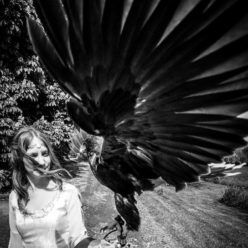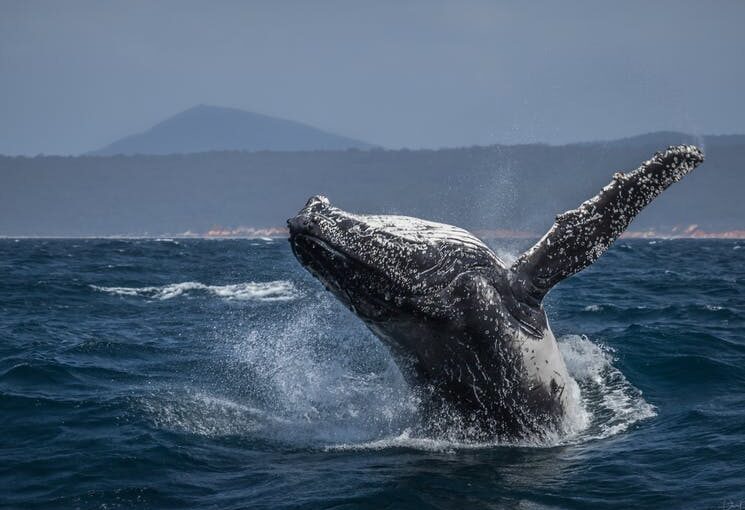A pelican suspends itself against a grey sky thickly smeared with misty forms. I watch it, holding my breath with its static.
There – it has flapped at last and sunk. I can no longer see it behind the thrashing head of a gum, nut-swollen and flinging honeyeaters. The purple jacaranda stands garishly vivid against the resolute rain that thunders against the thin windows.
I am alone.
When rain drums against a deliciously morbid sky, and the wind moans between the cracks in old, thin walls (blow, winds, crack your cheeks!) I think of the loneliness of lighthouses. Long days against the ache of wind and weather, filled with industry and the busyness of routines to sooth the mind – or concentrate it, whatever your preference. Curse the innovations of electricity that stole the lighthouse keeper from their tower! When Darlings lived alone against the storms and rowed the lips of whirlpools to save the drowning perhaps once or twice a year, to break up the tasks of cleaning the glass and metal of lanterns. What perfect profession – to live your life in service to humanity’s salvation, but rarely have to actually talk to them!
I should write a shanty about Grace Darling, or old Tom the Killer Whale, or a Rapunzel tale about a lighthouse keeper.
I imagine a pair of overalls – no skirt and apron to trip over on the one hundred spiral steps – and arranging the day’s metal out in a neat line for cleaning. Two hours a day amid the day’s other duties for twelve in a row to finish, then start again. Two hours a day in a high room, warmed by the glass from every side like a panopticon. I could look up from polishing in any direction, at any moment. Two hours every day, eying the sun passing from one headland of the bay to another to mark the time, singing songs to pass it.
I imagine hot days when the breeze off the coast is fresh relief to the close, moist heat just the other side of the melaleuca and wattle trees where the ground forms dips and hollows on Green Cape. West is emeralds, broken by the blood of bottlebrush or jacaranda amethyst. East; South, is sapphire blue, the eyes squinting against the opals of the sea until dusk eases the ache.
I imagine grey days like this one, blasted from all sides and the thrum of fear as the wind shrieks and waves bark against the impossible red cliffs. Sitting out the watch in the tower – every bit as confined as Rapunzel, scanning, scanning. Not praying for a prince, for rescue, but silently begging the sea to be empty of just such things. For who has to be the hero in this Rapunzel version, but Rapunzel herself? Retiring at last from the watch, eyes sore and body stiff from staring and hunching in the cold, to a warm fire and tea, maybe parsley or lambs lettuce in your supper.
How could I imagine bored children, desperate to get away from the company of all that sea? What life holds better purpose? To run the headlands and forests looking for wombat holes, the refuges of wallabies, banksia blooms and the calls of birds? To watch the sea eagle skim the bay, wheeling above the harbour? And then to take your place on duty at the four-hour watch above the tides and rocks to see the shifting of ages – to wish the migrating humpback whales God speed as they leave, then be the first to welcome them home again when they bring new calves. And if it is adventure you want, what better the rage of a sucking sea that cleaved the hull of the Ly-ee Moon steamer and flying on the waves to heave its passengers out of them? If it’s drink, there’s gin a-plenty. If it’s the brouhaha of the city, what more sociable conversation than the winds?
All this above Eden, which exists only because of the whaling industry. And whales very nearly don’t because of Eden.
Before whaling, it is estimated there were over 200,000 Southern Ocean whales. In fewer than a hundred years, there were 360. While the town of Eden, with its street names and memorial sites will have you think it was down to the acumen of about three pioneering families, the successful destruction of nearly a whole species was actually down to luck, and the deep affinity of the Thaua Yuin people with killer whales. This ancient relationship involved the belief that the spirits of dead relatives became these orcas. When humpbacks or baleen whales swam into the deep, natural harbour of Twofold Bay, the pod of orcas would trap it at one end while the lead bull would jump around a lot and signal to the oblivious watchers in Boyd Tower. The whalers would spot him, then launch their boats to row out and harpoon the humpback, rewarding the orcas with its tongue and lips before hauling it ashore to harvest the oil and bone. Before any fanciful narratives about intent can get carried away, there are lots of examples of predator animals that work together to hunt, like wolves, hyenas, prides, and several that cooperate inter-species for the same purpose. The spotted antbird of Costa Rica observes, follows, and benefits from the movement of ant swarms to eat crickets and invertebrates, and there is the honeyguide bird in parts of Africa that works with humans to locate beehives. Driven in part by instinct to eat, animals can learn.
Thus, it was these orcas that were the heroes and cunning hunters. Not the men that for seventy years made a fortune out of their exploitation of whales to the brink of oblivion, then obviously lost everything when there was nothing left to hunt. And the killer whale gets a real good rep in the town’s killer whale museum. More, in fact, than the Thaua people. Referred to throughout as ‘Aborigines’ and spoken of with some reverence in regard to their hunting skills and their ‘superior eyesight’ (I’m sure this was empirically verified), there is no mention about the treatment of these people and what happened to them when three families set up docks and stockyards and grazing on their land. It brushes over their employment by the Davidson family; one quotation refers to their payment of ‘slops and food.’ Well, confronting as it may be, and whatever the intent was at the time, that does meet the unfortunate definition of slavery. There is a small set of boards dedicated to Aboriginal dreaming in a very generic sense, but no representation from local people (I must be fair; there was one piece of art by a local Yuin man) that instructs about the specific life of the coast people, or offers recognition about how this brutal and short-lived industry impacted them.
As well as the blind spot on the First Nations people of the Sapphire Coast, there is another partial blindness to the brutality of whaling and its impact on the species. There is one board that notes the difference in numbers before and after whaling. And some pretty, wavy writing under a lot of other text that said Australia does not support whaling, but nothing joins up the two. Nothing offers recognition and ownership of the reality that it was the industry that did this. Eden did not make a conscious, conscientious, conservationist decision to stop whaling. It stopped because there were so few left it was no longer a viable industry.
But this blindness or silence on that salient point, and the contrasting wealth of information given about the uses of whales, how they were killed, who killed them, how big they were, along with unavoidably romanticised paintings and poems with a healthy dose of ‘rush-o!’ and ‘thar she blows!’ presents the industry and heritage of this town as undeniably glorified. I’m sure it was all very exciting and dangerous, and they were very brave and strong, and real men and all that – but where does it leave Eden now? Struggling to refocus its identity, it has turned to trawling – until we run out of fish too? and logging – until … ? when it could have led the way in whale conservation and remodelled on progressive science. On the direct migratory routes of several whale species, it is uniquely placed to be a centre for marine research and conservation, not to mention tourism. But admittedly, even if research became the dominant industry in the way that education centres sometimes can, it might not be for everyone. In a town that defined itself by the meaty, manly history of whaling, a research facility may not provide the full scope of options for your average bloke looking to understand who he is, how he fits in the world and how he can contribute to it.
The lighthouse would have been perfect.

